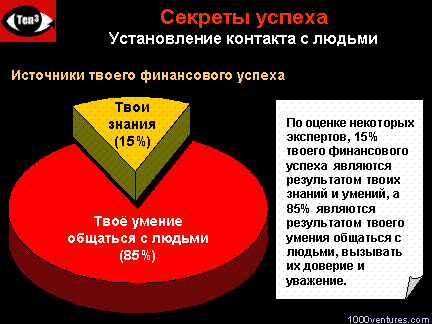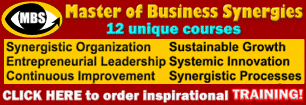|
Developing Yourself |
How To Achieve Extraordinary Results
by Vadim Kotelnikov, Founder of 1000ventures.com & Ten3 East-West
"I cannot teach anybody anything, I can only make them think" - Socrates
|
|
How to Achieve Extraordinary Results Yourself is the most critical variable of your success in achieving what you want. You can't control people or events, but you can manage your response to them. Your skill and our ability to manage yourself directly affect the extent to which you achieve your goals. Neuro-Linguistic Programming (NLP) NLP is the psychology of excellence and the technology of achievement and success. NLP explores how we think and feel and studies or 'models' excellence in every walk of life. NLP is first and foremost about action. By using NLP you can give yourself more conscious choice over what you do and the way you act. The awareness of how you do what you do is the key to self-management and influence. You can't control people or events, but you can manage our response to them. Your skill and your ability to manage yourselves directly affect the extent to which we achieve your goals...More Your Character Ethic and Personality Ethic The elements of Personality Ethic, such as communication skills, influence strategies, and positive thinking, are essential for success, but these are secondary, not primary traits. "You can pick up quick, easy techniques that may work in short-term situations. But secondary traits alone have no permanent worth in long-term relationships. Eventually, if there isn't deep integrity and fundamental character strength, the challenges of life will cause true motives to surface and human relationships failure will replace short-term success1". Only basic goodness gives life to techniques. To achieve great results, focus first on yourself - your deepest motives and perceptions - and then on your techniques. There are two main paths of the Personality Ethic:
Your Personal Development Personal development techniques can be used both personally and professionally. They will help you:
Self-awareness - the First Step to Influencing Others Great leaders, coaches and communicators don't focus extremely on their followers, coachees and audience. They have a high degree of self-awareness. We all have basic skills to lead, coach, or communicate; unfortunately, most of us have a few psychological blocks when it comes to applying those skills well and consistently. Knowing yourself will help you overcome your own blocks...More Emotional Intelligence "Emotional Intelligence" refers to your capacity to recognize your own feelings and those of others, for motivating yourself, and for managing emotions well in yourself and in your relationships. "It describes abilities distinct from, but complementary to, academic intelligence, the purely cognitive capabilities measured by IQ. Many people who are book smart lack emotional intelligence but lack emotional intelligence end up working for people who have lower IQs than they but who excel in emotional intelligence skills."3...More How To Be More Creative Creativity is not about inventing something totally new, it is about making new connections. You don't have to be a special kind of person to be creative - everyone can do it. It's not about who you are, it's about what you do. You just need to start looking for multiple solutions rather than settling for just one, and give yourself permission to be playful and inquisitive, flexible and versatile...More Communicating Effectively The three aspects (KFC) of effective communication are:
Connecting with People Connecting with people "is not about being phony or acting like someone you are not; it's about creating a favorable link between your internal nature with its beliefs and values, and the external world where you go to work."1 Learning to connect fast with your customers, colleagues, bosses, employees, and even total strangers by taking full advantage of your body, your mind, your voice, and above all your imagination will give you a significant competitive edge. It will help you maximize the potential in every relationship, be it personal, business-related, or social...More Learning to Lead Effective leaders recognize that what they know is very little in comparison to what they still need to learn. To be more proficient in pursuing and achieving objectives, you should be open to new ideas, insights, and revelations that can lead to better ways to accomplishing goals. This continuous learning process can be exercised, in particular, through engaging yourself in a constant dialogue with your peers, advisers, consultants, team members, suppliers, customers, and competitors...More
|
Bibliography:
-
"The 7 Habits of Highly Effective People", Stephen R. Covey, 1989
-
"NLP - the New Technology of Achievement", Steve Andreas and Charles Faulkner, 2001
-
"Working with Emotional Intelligence", Daniel Goleman, 1998
-
"How To Connect in Business in 90 Seconds or Less", Nicholas Boothman, 2002







